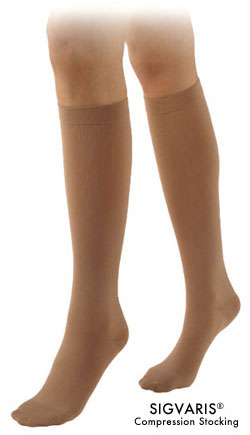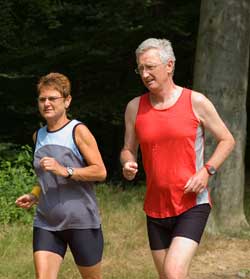 Proper care of your legs can help reduce the symptoms of problematic veins. It can also slow the development of new ones. Self-care is key to your comfort during pregnancy, and it's part of your aftercare for any type of treatment. The more you do, the better your results are likely to be.
Proper care of your legs can help reduce the symptoms of problematic veins. It can also slow the development of new ones. Self-care is key to your comfort during pregnancy, and it's part of your aftercare for any type of treatment. The more you do, the better your results are likely to be.
Prevention may include increasing exercise with walking or other activities which improve circulation, elevating the feet while sitting, maintaining bowel regularity by eating a high-fiber diet and avoiding excess weight. Also to be avoided are constrictive clothing and shoes with high heels.
COMPRESSION STOCKINGS
Compression stockings, which are available at department and drug stores, may have inadequate support for your legs. Most effective stockings require your doctor to write a prescription.
Tips for Using Compression Stockings
To use stockings safely and effectively:
• Make sure to wear them correctly. Pull them to the designated height and no further. Don't let them bunch up at the top, as this can restrict circulation.
• Replace them when they start to become loose, which is often after about 4 to 6 months.
• Don't sleep in them unless directed to.
• Wear the length recommended by your doctor.
• If you don't want to wear them all the time, use them as much as possible. For example, wear them when you'll be standing or sitting for long periods.
• If you have trouble pulling them on, wear thin rubber gloves to help improve your grip and prevent tearing.
 EXERCISE
EXERCISE
Working calf and thigh muscles helps move blood upward and keeping these muscles toned may help with blood flow even when you're sitting or standing. To get the most benefit:
• Walk. This is the best choice, but any exercise that works the leg muscles helps.
• If you're new to exercise, start with short walks. Work up to 30 minutes of exercise, most days of the week.
• If you sit most of the day, take walking breaks from time to time. Just changing positions may provide some relief.
ELEVATION
Raising your legs lets gravity help blood flow back to the heart. For the most benefit, raise your feet a few inches above your heart, 2 to 3 times a day for 15 minutes. If this is not practical, do as much as you can. Any elevation can help.
 EVALUATING YOUR LIFESTYLE
EVALUATING YOUR LIFESTYLE
Are there things you can change about your lifestyle that might help relieve your symptoms?
• Are you overweight? If so, losing weight may help relieve some of your symptoms.
• Is your diet a factor? Too much sodium in your food can make you retain water. Cutting back may help reduce swelling.
• Do you travel often? Sitting in one position for long periods can worsen symptoms. During car trips, stop frequently for short walks. During plane flights, take a stroll in the aisle every hour or so. While in your seat, move your feet and ankles to work your calf muscles. And wear your compression stocking!
